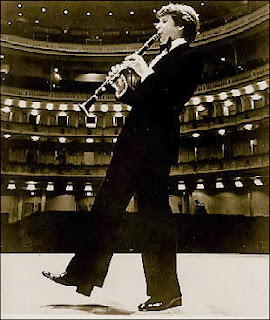IT’S EASY FOR A PERFORMER to decide, “I’m a clarinetist. I have to do the right clarinet things.” Presenting the audience, then, with the clarinet stuff we’re already used to, which seems to come down to Mozart and familiar transcriptions.
 |
| Richard Stoltzman |
Add to that some refreshingly clean and exciting playing and you have a performer who may do as much to advance the cause of his instrument as Benny Goodman did.
Stoltzman and pianist Bill Douglas also managed to work bassoon, percussion, scat singing, and ten more clarinets into the concert: again, not your usual setup.
Two clarinet sonatas were featured. The first, by Schubert, is a transcription of a violin sonatina that worked extremely well on the woodwind instrument, which has more sympathy with the fiddle’s tone of voice than the more eager-to-be-transcribed flute.
Leonard Bernstein’s sonata was written when the composer was 23 and possibly a little self-conscious of the jazzy voice that soon would be identified with him. The work, excellently played, owes its rhythms to Prokofiev and its dialect to Copland, with some funky Bernstein emerging in the fast finale.
Douglas switched from piano to bassoon to join Stoltzman in four of Bach’s two-part inventions. What marvelous little studies those are! Too long the property of possessive keyboardists, they sit well in the throats of the contrasting reeds. And the choice of four ranged from ballad to jump, giving us some fast fingerwork to close the set.
Steve Reich wrote his “New York Counterpoint” for Stoltzman, who first performed it a year ago. It has a taped accompaniment of ten clarinets exploring the six-note melody that is transmogrified into three individual sections, the linking device being a six-note choral tremolo.
Minimalist? Oh, yes. It’s a piece that opens its bag of mysteries upon a first hearing, and like so much of the so-called “new age” stuff then fades into nonthreatening background music.
It must be an exciting trip for the performer to keep up with the relentless tape, and Stoltzman certainly gave it his virtuoso best. The third section of the piece was by far most interesting, with a swing-like rhythm to relieve the monotony of ostinato.
The second half of the program was given over to jazz and pop selections, many of them Douglas originals. He, too, has succumbed to the “new age” lure, and songs like “Full Moon” and “Sky” have too much rinky-dink prettiness and too little tension, melodically and harmonically, to sustain active interest for too long.
Douglas is a demonstrative player with a heavy technique, well-suited to the bop-era music he obviously likes. His duo with Stoltzman on “Someday My Prince Will Come” had a wonderful progression of styles, from formal to improvisatory, that showed Stoltzman’s ease with jazz.
There nevertheless seemed to be some timidness about how to present the jazz tunes. The solos weren’t clearly laid out and were apologetically short.
A salute to Thelonius Monk was a suite of “Round Midnight” and the funky “Well, You Needn’t” played on bassoon and clarinet, a strong argument for including the bassoon in a jazz band.
Stoltzman gave a gorgeous ballad reading of Jimmy Rowles’s “The Peacocks” and an up-tempo, humorous performance of Ornette Coleman’s “Ramblin’.”
Douglas the pedagogue was revealed in a study he wrote for jazz classes: “Rock Etude No. 16" is an a cappella scat piece to teach the would-be rocker complicated rhythms, sung by the performers to the audience’s delight.
The concert closers were two more Douglas originals: “Begin Sweet World,” a ballad that had the soul the opening numbers lacked, and “Feast,” a 6/8 dance with a hornpipe feel that Stoltzman switched to maracas in the midst of.
A slow, sweet “Amazing Grace” was the perfect encore.
– Schenectady Daily Gazette, 19 January 1987
No comments:
Post a Comment